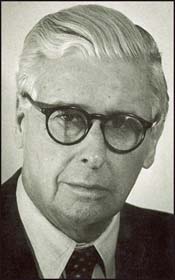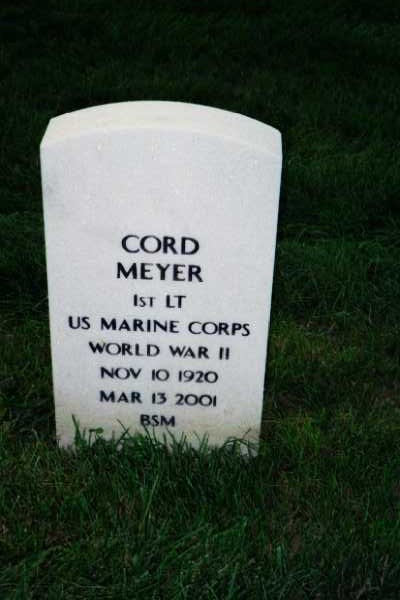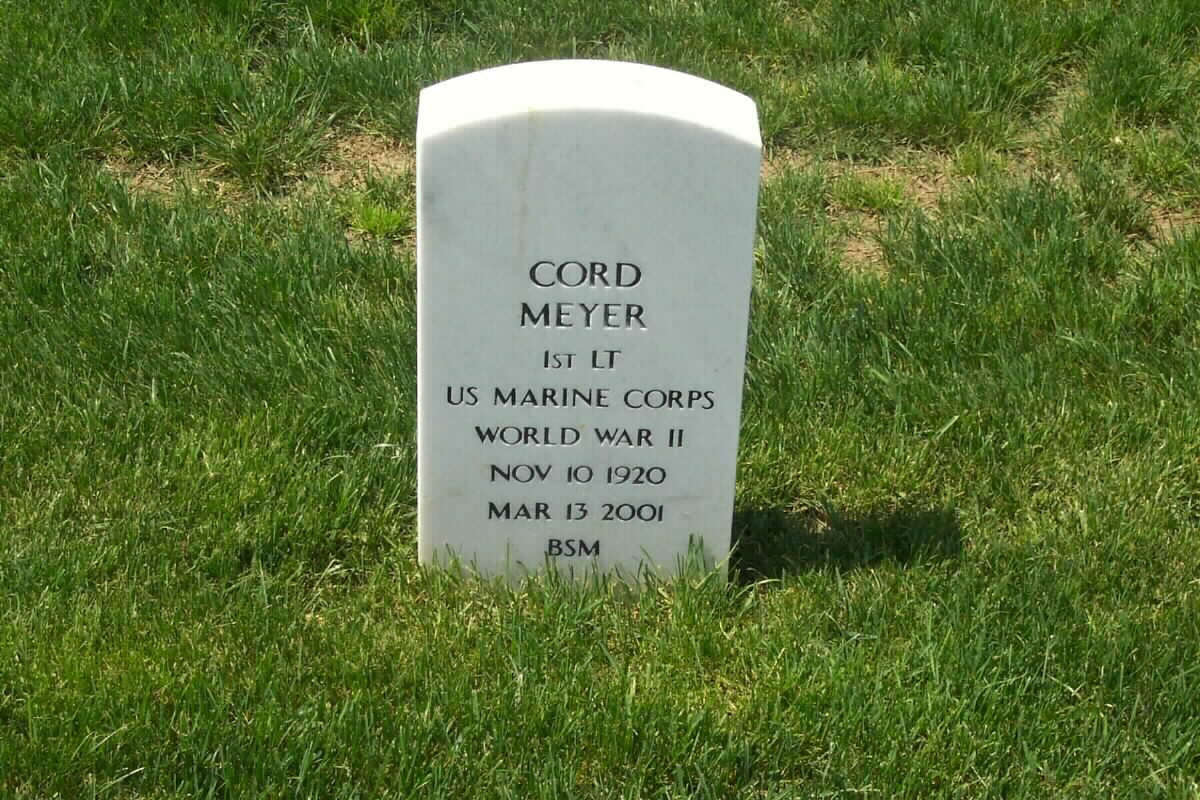From a contemporary press report
Cord Meyer Jr., Communism Fighter at C.I.A., Dies at 80
WASHINGTON, March 15, 2001 — Cord Meyer Jr., an articulate and passionate strategist who helped guide the young Central Intelligence Agency’s efforts to contain Soviet communism at home and abroad, died here on Tuesday. He was 80.
Mr. Meyer, whose career took extraordinary turns, from soldier to author to liberal activist to spy to newspaper columnist, died of lymphoma and other ailments at the Washington Home, a long-term health care facility.
In his 26 years at the C.I.A., where he held management positions in the covert operations branch, Mr. Meyer drew criticism from many liberals for his role in efforts to subsidize student and labor groups in this country as counterweights to Soviet- backed groups in Europe.
Yet, for all his ardent anti-communism, which associates said was a lifelong principle, Mr. Meyer faced accusations at the height of the McCarthy era that he was a Communist sympathizer.
George J. Tenet, the C.I.A. director, released a statement calling Mr. Meyer “a passionate defender of freedom around the world.”
“Cord defined the concept, doctrine and implementation of covert action on behalf of the security and interests of our nation,” Mr. Tenet said.
Mr. Meyer’s life was characterized by great privilege and considerable personal tragedy.
Born here in 1920, the son of a diplomat and grandson of a New York State Democratic chairman, Mr. Meyer attended elite schools and entered Yale University in 1939. In 1942, he enlisted in the Marine Corps Reserve. He was sent to the South Pacific, where, as a machine-gun platoon leader, he took part in the assault on Guam. He was wounded in a grenade attack and lost his left eye. He was later awarded the Purple Heart and Bronze Star.
Mr. Meyer’s twin brother, Quentin, was killed at Okinawa.
A fluent writer whose dispatches from the war were published in The Atlantic Monthly, Mr. Meyer at age 26 completed a short story, “Waves of Darkness,” that won the O. Henry Prize in 1946 for best first-published story.
After he returned home from the war, he was named a special assistant to Harold E. Stassen, a member of the United States delegation to the 1945 conference that founded the United Nations.
As Soviet influence grew in the postwar era, Mr. Meyer spread his hopes for arms control and a democratic world government led by the United Nations.
“He was young and idealistic and very much involved in the one world movement,” said Jeane J. Kirkpatrick, a former American delegate to the United Nations. But, she added, “he was a consistent anti-communist” who did not trust the Soviets.
Mr. Meyer was a founding member of the United World Federalists, where he fought for controls on the use of atomic weapons. He also helped establish the American Veterans Committee, a liberal group that sought to deny preferential treatment for veterans. While in that organization, he came in direct contact with Communist infiltration techniques, said his son, Mark Meyer. Mr. Meyer’s moves to thwart Soviet agents helped exonerate him from accusations that he would soon face, his son said.
With the explosion of an atomic bomb by the Soviet Union in 1949, Mr. Meyer saw his hopes for arms control dissipate and was troubled by the Berlin blockade and the invasion of South Korea. He left his postgraduate work at Harvard and signed up with the C.I.A.
Two years after joining the spy agency, Mr. Meyer was accused by the F.B.I. of Communist sympathies. A C.I.A. hearing board eventually acquitted him of all charges.
Mr. Meyer had married the former Mary Pinchot, a free-lance writer and editor, in 1945. One of the couple’s three sons, Michael, died at age 9 in a car accident. Soon after that, the couple divorced.
Mrs. Meyer was fatally shot in 1964 as she walked along the towpath of the Chesapeake and Ohio Canal in Georgetown. A day laborer found hiding in the bushes along the canal was acquitted of the crime, and it remains unsolved.
After her death, Mrs. Meyer’s sister and brother-in-law said they saw the top C.I.A. counterintelligence officer, James J. Angleton, try to break into her home and take her diary.
Mrs. Meyer’s brother-in-law, Benjamin C. Bradlee, later became executive editor of The Washington Post. The diary, which Mr. Bradlee and his wife found later that day, disclosed an affair between Mrs. Meyer and President John F. Kennedy.
While at the C.I.A., Mr. Meyer eventually became second-in-command of worldwide clandestine services. But, in the public mind, he was more associated with a number of domestic activities, some of which were denounced as “dirty tricks” by his critics and are prohibited today.
In 1967, the leftist magazine Ramparts disclosed that the C.I.A., under Mr. Meyer’s direction, had provided money to American student groups and a literary magazine as part of an anti-Communist campaign.
Five years later, news organizations reported that he had asked a publisher to let the C.I.A. review a book that was critical of the agency before it went to press. The publisher was a former colleague from Mr. Meyer’s days as a liberal activist.
At the agency, Mr. Meyer supervised Radio Free Europe and Radio Liberty, the United States government broadcasts to Eastern Europe.
Mr. Meyer wrote three books, including a memoir, “Facing Reality,” which reflected on his journey from an advocate of world government to his role as spymaster. For nearly 20 years ending in 1998, he was a nationally syndicated columnist; his work appeared frequently in The Washington Times.
In one magazine piece that suggested his evolving personal creed, Mr. Meyer came to the conclusion that “no sudden and spectacular improvement in the ways of the world is possible.” Yet, in seeking a better existence, the key, he said, “is to preserve faith without illusion.”
Mr. Meyer’s survivors include his wife, Starke P. Meyer of Washington; his sons, Quentin, of Washington, and Mark, of Richmond, Va.; a stepson, Nicholas Anderson of Great Falls, Va.; a stepdaughter, Alexis Anderson of Washington; a brother, Thomas D. Meyer of Hamilton, Mass.; and a grandson.
Courtesy of the Washington Post:
Key CIA Figure Cord Meyer Dies; Headed ‘Dirty Tricks Department’
Thursday, March 15, 2001
Cord Meyer Jr., 80, a figure central to many of the Central Intelligence Agency’s covert operations during the Cold War, including the secret funding of student, labor and literary groups, died March 13, 2001, at the Washington Home. He suffered from a variety of ailments, including lymphoma.
Mr. Meyer, who was with the CIA from 1951 to 1977, joined as a prominent young liberal who was active in the world government movement. He advanced to become the top deputy in a section of the agency called the “dirty tricks department” by detractors because of its elaborate activities aimed at curbing communist influence.
Mr. Meyer gained notoriety in 1967 when it was revealed in the radical magazine Ramparts that, under his direction, the CIA had been subsidizing groups such as the National Student Association and the literary journal Encounter.
In a 1978 interview, Mr. Meyer said of the controversy, which was investigated by a presidential panel, that “the object was not to subvert students, of course, but to make it possible for the American point of view to be represented.” At the time, Soviet operatives were having success recruiting student organizers around the world.
Mr. Meyer again made headlines in 1972, when it was revealed that he had asked an old friend from the world government movement, who was then in the publishing business, to allow the CIA to review the galley proofs of a book critical of the agency’s dealings with the drug traffic in Southeast Asia.
The instances offered rare glimpses into the internal mechanics of a shadowy agency that was coming under increasing scrutiny by critics of its tactics. In both cases, Mr. Meyer said he had not run afoul of the law and had the nation’s security interests at heart. In a statement yesterday, CIA Director George J. Tenet called Mr. Meyer “a passionate defender of freedom around the world.”
Mr. Meyer and his twin brother, Quentin, were born in Washington, where his father, a diplomat and Long Island real estate developer, was between overseas postings. The family later settled in New York City, where Mr. Meyer enjoyed a youth of privilege. He attended St. Paul’s preparatory school in New Hampshire and Yale University. He graduated a semester early in 1942, with bachelor’s degrees in English and philosophy, so that he could enter the Marine Corps.
He fought in the Pacific and was badly wounded by a Japanese grenade during a landing on Guam in 1944. He lost an eye as a result of the wound and spent the next several months in military hospitals. His decorations included the Bronze Star and the Purple Heart. He later learned that his twin had been killed in the fighting on Okinawa.
In war dispatches that were published in the Atlantic Monthly and in a 1946 autobiography titled “Waves of Darkness,” Mr. Meyer articulated an ideology colored by his war experiences. In the autobiography, he wrote: “The only certain fruit of this insanity will be the rotting bodies upon which the sun will impartially shine tomorrow. Let us throw down these guns that we hate.”
The book won him the O. Henry Prize in 1946 for the best first-published story.
After the war, he served as an aide to Harold Stassen, the United States delegate at the drafting in San Francisco of the United Nations Charter. Mr. Meyer then became active in the world government movement, where his intellect and rough-hewn good looks made him a popular spokesman for the post-World War II generation. He helped found the United World Federalists, which sought to avoid nuclear war by a loose federation among nations.
Mr. Meyer also took an active part in formation of the American Veterans Committee, a liberal group dedicated to the idea that veterans should get no special treatment.
Mr. Meyer, who was considered a rising star in liberal circles, stunned some of his fellow activists when he joined the CIA in 1951 after being recruited by Allen Dulles, who later became CIA director.
Shortly after he joined the agency, Mr. Meyer was accused by the FBI of having communist sympathies. He was exonerated in an internal hearing.
He had married the former Mary Pinchot shortly after the war. Their 9-year-old son, Michael, was killed in an automobile accident in 1959. Shortly afterward, the couple divorced. Mary Meyer was slain along the C&O Canal towpath in 1964.
In the days after her death, her sister, Tony Pinchot, and Pinchot’s then-husband, Benjamin C. Bradlee, observed CIA counterintelligence chief James Jesus Angleton, a colleague of Cord Meyer, attempting to break into Mary Meyer’s house and recover a diary. Mr. Bradlee would later become executive editor of The Washington Post.
The diary, discovered later that day by Mr. Bradlee and Ms. Pinchot, revealed a romantic connection between President John F. Kennedy and Mary Meyer.
Mr. Meyer’s official title from 1967 to 1973 was assistant deputy director of plans, a post in which he worked with legendary spymaster Thomas H. Karamessines, also known as “The Greek.” Among Mr. Meyer’s duties was the CIA’s management of Radio Free Europe and Radio Liberty.
It was assumed that Mr. Meyer would eventually advance to Mr. Karamessines’s position, but the public disclosure about the book deal and the subsidization of the National Student Association apparently dampened his prospects. Over the years, colleagues had described him as intelligent, but also hard to get along with. He retired from the agency in 1977 after a posting as the London station chief.
He was honored by the CIA as a “trailblazer” in 1997, when the agency celebrated its 50th anniversary. He was awarded three Distinguished Intelligence Medals during his career.
After retiring, Mr. Meyer published several books, including a memoir titled “Facing Reality: From World Federalism to the CIA.” He also wrote a column that ran in such papers as the Washington Times and reflected his staunchly anti-communist positions.
He was a member of the Metropolitan Club, the Yale Club of Washington and the Council on Foreign Relations.
Mr. Meyer is survived by his wife of 35 years, the former Starke Patteson; two sons from his first marriage, Mark, of Ashland, Va., and Quentin, of Washington; a stepson, Nicholas Anderson of Great Falls; a stepdaughter, Alexis Anderson of Washington; a brother; and a grandson.
MEYER, CORD
On Tuesday, March 13, 2001 of Washington, D.C. Husband of Starke P. Meyer; father Quentin Meyer and Mark Meyer; step-father of Alexis Anderson and Nicholas Anderson; step- grandfather of Sasha Strickland; brother of Peter Meyer. Graveside service and interment will be held on Thursday, March 29, 2001 at 11 a.m. at Arlington National Cemetery with full military honors. Friends are asked to assemble at the Administration Building at 10:30 a.m.
FOR IMMEDIATE RELEASE
14 March 2001
STATEMENT BY DIRECTOR OF CENTRAL INTELLIGENCE GEORGE J. TENET ON THE DEATH OF CORD MEYER
I am greatly saddened by the death of Cord Meyer, a passionate defender of freedom around the world. During a remarkable intelligence career spanning more than a quarter of a century, Cord defined the concept, doctrine, and implementation of covert action on behalf of the security and interests of our nation. At the height of the Cold War, he played an instrumental role in America’s effort to counter Soviet influence. His leadership, innovation, and creativity inspired his colleagues and helped shape the Agency’s history.
After retiring from the Agency in 1977, Cord’s passion and his profound knowledge of world affairs was reflected in his thoughtful columns on a wide range of issues.
It was with great pride that CIA honored Cord Meyer as one of its Trailblazers when the Agency celebrated its 50th anniversary in 1997.
I want to express my deepest condolences to the Meyer family on behalf of all the men and women of the Intelligence Community.
CIA Press Release
10 September 1997
CIA to Mark 50th Anniversary, Honor “Trailblazers”
The Central Intelligence Agency, which marks its 50th anniversary on September 18, is pleased to announce 50 individuals selected as CIA Trailblazers. These Trailblazers, whose accomplishments range from laying the groundwork for remarkable clandestine collection achievements to analyzing weapons intelligence that has contributed significantly to national arms control policies, will receive medallions from Director of Central Intelligence George J. Tenet at a ceremony on September 18.
The Trailblazers ceremony will cap several days of events commemorating a half century of CIA service to the nation in protecting American citizens worldwide. The events include a September 17 program honoring nearly 4,000 CIA retirees. All activities are by invitation only.
The Trailblazer Award was proposed by the CIA50 Steering Committee, comprised of officers from across the Agency, as a way to recognize CIA officers, from the Office of Strategic Services days to present, who by their actions, example, and innovations or initiative, have taken the CIA in important new directions and helped shape the Agency’s history, said Mr. Tenet.
Congratulating the 50 awardees and their families, Mr. Tenet said, As you well know, secrecy is a necessary part of the intelligence profession. Your achievements probably will never be known in their fullness by the American people. I am convinced, however, that the American people would be enormously proud if they knew of your service, and I hope you will accept this award as an expression of thanks from a grateful nation.
Earlier this year, the CIA invited OSS veterans and former and current CIA employees to submit nominations for the award. Nominations were limited to those individuals — of any grade, in any field, and at any point in CIA’s history – who distinguished themselves as leaders, made a real difference in CIA’s pursuit of its mission, and who served as a standard of excellence for others to follow.
We were gratified to receive over 300 nominations, and a select panel worked very hard to narrow that esteemed group to just 50 CIA Trailblazers, Mr. Tenet said.
CORD MEYER, JR.
1951-1977
Mr. Meyer defined the concept, doctrine and implementation of covert action. He was especially effective in using foreign media publications in support of US foreign policy objectives. At the height of the Cold War, he orchestrated much of the free world’s effort to counter the Soviet-dominated Communist Front organizations.
MEYER, CORD
1ST LT US MARINE CORPS
- VETERAN SERVICE DATES: 03/10/1942 – 06/01/1945
- DATE OF BIRTH: 11/10/1920
- DATE OF DEATH: 03/13/2001
- DATE OF INTERMENT: 03/29/2001
- BURIED AT: SECTION 60 SITE 7942
ARLINGTON NATIONAL CEMETERY
Michael Robert Patterson was born in Arlington and is the son of a former officer of the US Army. So it was no wonder that sooner or later his interests drew him to American history and especially to American military history. Many of his articles can be found on renowned portals like the New York Times, Washingtonpost or Wikipedia.
Reviewed by: Michael Howard



